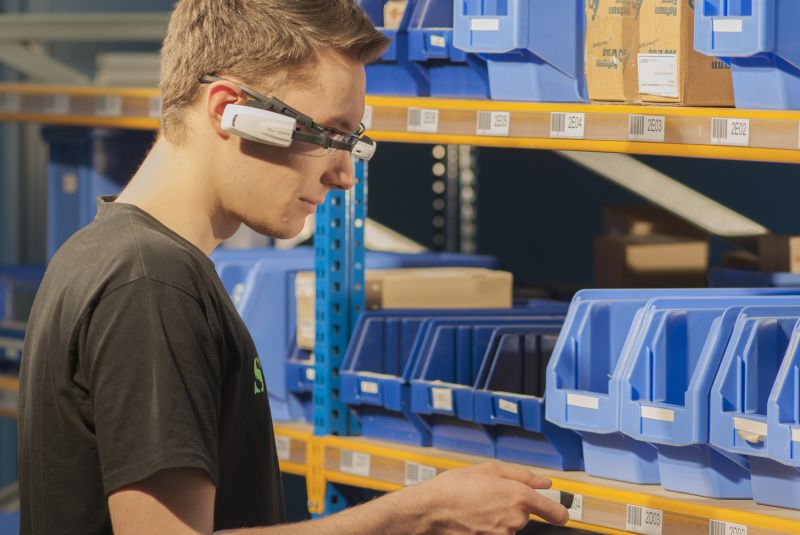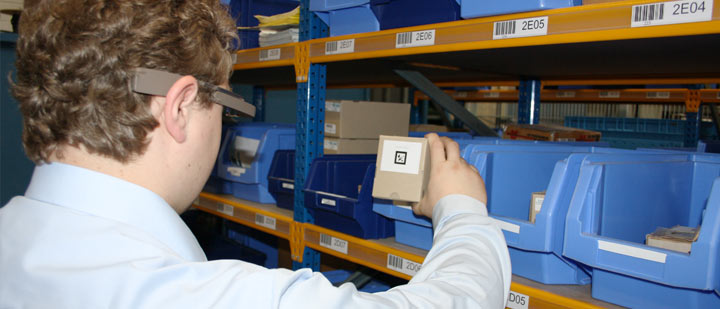Picking is one of the central tasks in intralogistics. Due to the cognitive abilities and the advanced human grasping apparatus, manual picking is still used in many application scenarios today, as the flexibility of the employees outweighs the cost-effectiveness of an automated system. Different technologies are used to make the informational process paperless and more efficient in contrast to classic paper-based picking and to supply the employee with order-relevant data. Pick-by-Voice systems, in which order-related information is transmitted by voice, are widely used, but largely exclude people with hearing impairment. The Pick-by-Vision technology developed at the fml chair, in which information is provided visually via data goggles, can make it possible to integrate deaf people into warehouse processes and thereby take advantage of paperless picking.
![[Translate to en:] Einblendungen einer Datenbrille](/fileadmin/w00cbp/fml/Forschung/Projekte/Abgeschlossene_Projekte_2017/Work_by_Inclusion/Pick-by-Vision_statische_Informationsbereitstellung_Blick_durch_HMD2_500.jpg)
The overall aim of the project is to include people with hearing disabilities in the work process by providing modern work aids. These working aids, with data glasses for the visual provision of information as the main component, enable the unrestricted use of severely handicapped persons for paperless order picking with both hands free. Not only the presentation of information is considered, but also a multimodal interaction between hearing and non hearing people is emphasized, so that communication obstacles are pushed into the background. For example, functions are planned with the help of which a deaf employee can call someone to him or herself and speech can be converted into text by means of computer-aided recognition. Furthermore, in the event of an alarm or fire, for example, an emergency warning can be issued via the data glasses. The project contributes to the social goal of including disabled people in working life. In view of the growing shortage of skilled workers, a new group of employees is opening up for the intralogistics sector.

The Work-by-Inclusion project is divided into four modules. At the beginning, both the general requirements for warehouse processes and the specific requirements of deaf people are analyzed. Based on this, application scenarios for the use of the Pick-by-Vision system are defined. The concept development in the next processing step includes a detailed research about current data glasses and further required periphery as well as the elaboration of the system architecture. This is followed by the development of a test system, which largely comprises the development and adaptation of software for the data glasses and the underlying warehouse management system. The system will be examined and continuously improved during an extensive test and evaluation phase at the project partner Schmaus GmbH before the pilot application is extended to other practical partners. The last project module includes the transfer of the technology to industry, associations for the disabled and integration offices as well as the further development of the system into a near-series prototype.
The project Work-by-Inclusion will be carried out within a consortium consisting of two industrial partners and the chair fml.
The company Schmaus GmbH as initiator of the project employs hearing-impaired and deaf employees in logistics and has been working together with integration offices for the integration of severely handicapped people into the work process for several years. A sign language interpreter is familiar with the processes within the company and supports the active assistance of the disabled in the development process of the system.
CIM GmbH, the second industrial partner in the project, has been developing warehouse management systems for almost 30 years. The system house has already been involved in research projects on the use of Pick-by-Vision technology. In addition, comprehensive expertise is available for the design and operation of picking systems.
The fields of activity of the Chair of Materials Handling Material Flow Logistics - fml include the planning and further development of technical systems in intralogistics. For example, the Pick-by-Vision technology was developed at the chair. Already in 2009, a research project for the development of a practical concept to increase performance and quality in manual order picking through the use of augmented reality technology was successfully completed. The chair fml has gained profound knowledge and experience in the application of Augmented Reality on a laboratory scale. In what is now the third project on Pick-by-Vision technology, these are to be further expanded with a special focus on the inclusion of the deaf in operational processes.
